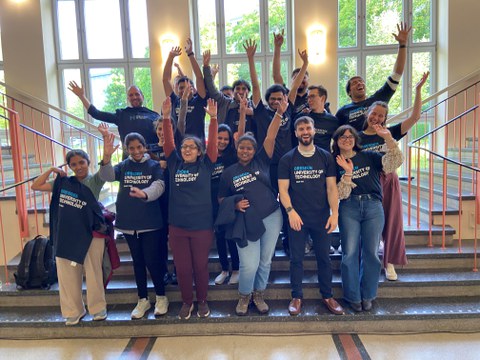Jun 11, 2025
Sustainability in focus: International workshop on life cycle analysis in mechanical engineering
by Dr.-Ing. Robert Kupfer, Head of the Neutral Lightweight Construction Group at the Institute of Lightweight Engineering and Polymer Technology, Faculty of Mechanical Science and Engineering
How can sustainability not only be addressed in university teaching, but actively practiced? In its sustainability strategy, the TUD pursues the goal of strengthening education for sustainable development (ESD) in all degree programs - also through innovative teaching formats that convey interdisciplinary thinking, systemic connections and global perspectives.
International workshops and summer schools offer an ideal field for experimentation here: they allow new didactic ideas to be tested in an open learning environment, evaluated and, if successful, institutionalized. English-language formats in particular not only contribute to sustainability education, but also promote the internationalization of teaching and research. They not only offer a space for academic exchange, but also the opportunity to anchor sustainability as a cross-cutting issue in university teaching.
The General Assembly of the HERITAGE network took place at the TUD from May 12 to 15, 2025. The network brings together leading European and Indian universities that deal with issues of sustainable development, technical education and international cooperation.
The General Assembly focused on the topic of global education. Representatives of the member institutions discussed the further development of the network and strategies to promote transnational teaching and global responsibility in higher education.
At the same time, a workshop was held for doctoral students on the application of life cycle assessment in mechanical engineering. The aim was to sensitize young researchers to environmental impacts along the product life cycle and to convey methodological principles in a practical way.
The TUD is a member of the HERITAGE network and is represented on the steering committee by Maike Heitkamp-Mai, Sustainability Management Officer. Prof. Ercan Altinsoy, Chair of Acoustics and Haptics and Internationalization Officer of the School of Engineering Sciences, was accepted as an honorary member of the Steering Committee at this year's General Assembly for his many years of commitment. The thematic focus of the network complements TUD's sustainability strategy and internationalization goals.
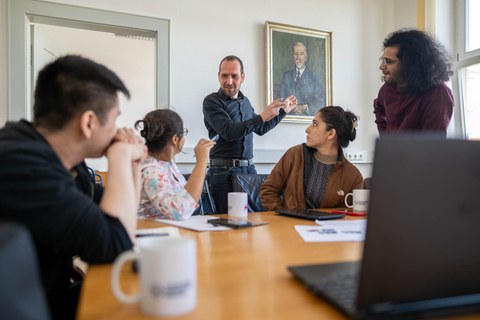
Dr. Robert Kupfer beim Workshop "Life Cycle Assessment in Mechanical Engineering"
In the engineering sciences in particular, this opens up valuable opportunities to combine new perspectives on technological developments with societal responsibility. Mechanical engineering, for example, is characterized by a strong focus on technical issues and innovative detailed solutions. However, knowledge about the environmental impact of technical products often remains incomplete - especially when it comes to the complex interactions along the entire product life cycle. In order to justify the claim that scientists and engineers also bear a central responsibility for a sustainable society, these interrelationships must be more strongly integrated into education.
One starting point for this was the international workshop "Life Cycle Assessment1 in Mechanical Engineering", which took place at TUD as part of the Heritage Network Meeting. The aim was to make a contribution to ESD and to teach participants the basics of life cycle thinking. The aim was not only to familiarize participants with the methodological steps of life cycle assessment - from goal and scope to life cycle inventory to impact assessment - but also to raise awareness of the far-reaching decisions that product developers and designers make in their day-to-day work.
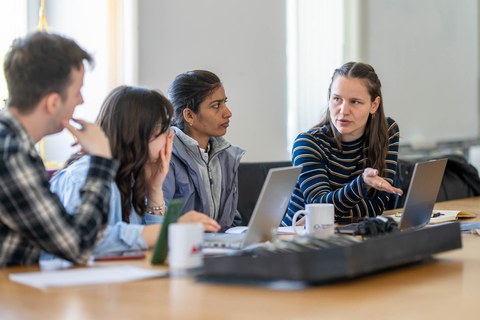
Eindrücke vom Workshop
The target group were early career scientists from mechanical engineering - especially doctoral students from the Heritage network. The participation of TUD researchers also promoted international exchange. A total of 16 young scientists from European and Indian technical universities took part, half of whom were women.
In the workshop, the methodological basics were first taught in lectures: from the background and standards of life cycle assessment to practical application examples. This was followed by step-by-step instructions on the four phases of life cycle assessment and an excursus on environmental impacts and their quantification, from climate change to acidification, eutrophication2 to the ozone layer depletion, summer smog and toxicity3. For the practical application, the participants were divided into four mixed teams, each of which worked on a use case from lightweight construction:
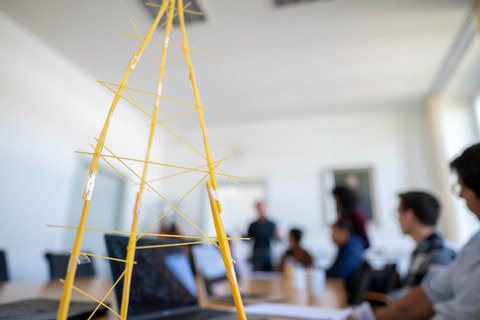
Ein Modell aus Spaghetti
First, the teams learned about the respective product system, including manufacturing technologies, supply chains, use and disposal or recycling. They then systematically worked through the four phases of the life cycle assessment, drew up life cycle inventories and quantified the environmental impacts using freely available software and databases. Hot-spot, scenario and uncertainty analyses were also tested. The results of the work were regularly presented in discussion rounds and jointly reflected upon. The combination of well-founded input, practice-oriented exercises and intensive exchange ensured a lively learning atmosphere throughout. The last day was particularly exciting: in a pitch session, the teams presented their results on poster walls to the international guests of the Heritage Network.
As a workshop leader, I was impressed by the intrinsic motivation with which the participants worked on the topic for three days. The varied design - from compact lectures to intensive small group work and lively discussions - enabled the participants to develop both professionally and personally. It also became clear that sustainability is not just a technical challenge, but also a question of international cooperation, interpersonal encounters and mutual learning.
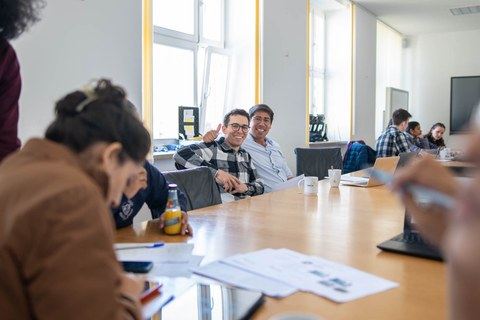
Teilnehmende des Workshops
The feedback from the participants was also impressive. Sumitkumar from India, for example, emphasized how valuable the practical exercises on life cycle analysis were for his own field of research in the area of sustainable manufacturing technologies. "The combination of basic knowledge and practical applications opened up new perspectives for me in terms of assessing environmental impacts," he reported enthusiastically. Bhavita emphasized how relevant the methods learned are for other engineering disciplines - for example for geotechnical applications, where material usage and carbon footprint play an increasingly important role. For them, the workshop impressively demonstrated that LCA as a tool can also contribute to more sustainable engineering in areas outside their field of expertise.
These voices show that the workshop not only imparted knowledge, but also provided new impetus for research and application. A real highlight of the university year - I have rarely felt so much joy and gratitude in my work. And many participants said at the end that they would have liked to have spent a few more days to dive even deeper into the exciting topics.
Footnotes
-
LCA = Life Cycle Assessment is a tool for systematically assessing the environmental impact of a product or process over its entire life cycle.
-
Accumulation of nutrients, especially nitrogen and phosphorus, in bodies of water, which can lead to excessive algae growth and subsequently to oxygen deficiency and species extinction.
-
Harmfulness of a substance to living organisms, which can lead to health or ecological damage depending on the type, concentration and duration of exposure.

